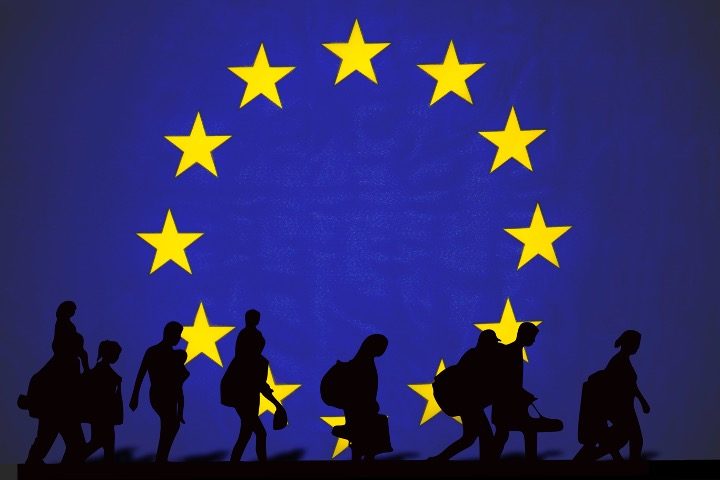
The European Union is presenting its member states with an ultimatum: “Get on board with our globalist migration program or suffer the consequences.” But not every nation in the bloc is taking the threat lying down.
As Euro News reports, EU member states that neglect to enforce the New Pact on Migration and Asylum, which received narrow approval from the European Parliament on Wednesday, may be subject to punitive measures.
Ylva Johansson, the Swedish politician who has served as European Commissioner for Home Affairs and Sweden’s European Commissioner in the von der Leyen Commission since December 2019, made clear: “All member states have to implement it and apply it.”
Johansson, who spearheaded the migration policy, added: “If not, the Commission will of course act and use — if necessary — infringement (procedures). But I must say that I’m pretty convinced that member states will implement the Pact now quite quickly.”
The New Pact comprises five interconnected legislative components designed to create uniform and foreseeable regulations for handling the reception and relocation of asylum seekers. The objective is to depart from a decade of uncoordinated and disorderly responses.
In 2023, the EU processed 1.14 million requests for international protection, marking a seven-year peak, and recorded 380,000 unauthorized border crossings, with half occurring via the Central Mediterranean.
After four years of negotiations plodding along, MEPs just barely scraped out approval for the pact in a vote on Wednesday, paving the way for the expected final approval from member states by the end of April.
But Polish Prime Minister Donald Tusk has maintained a strong voice of opposition against the measure, blasting the “unacceptable” system of “mandatory solidarity” on which it is based.
Specifically, the pact establishes that member states will be presented with three choices for handling migration flows: relocating a designated number of asylum seekers, paying €20,000 for each applicant they opt not to relocate, or funding operational assistance such as personnel and equipment. While Brussels targets 30,000 relocations annually, it emphasizes that the system will not compel any country to accept refugees as long as they contribute through either of the other two options.
The problem for migration hardliners like Tusk is that, under this system, EU member states are forced to accept migration one way or another. They can either accept the actual migrants into their nation’s borders and thus experience the consequences that come with mass migration; or they can reject the migrants but be penalized by being forced to pay for the migrants to be settled elsewhere in the European Union. Either way, Europeans find themselves obliged to pick up the tab for migrants.
“We will protect Poland against the relocation mechanism,” said Tusk in a press conference on Wednesday. The Polish head of state, the leader of the center-right Civic Platform party, returned to the premiership in December on a promise of reversing the trends of the Eurosceptic Law and Justice party’s eight-year rule.
In view of this, it can be speculated that Tusk must remain hardline on migration to appease the right-wing elements in his country and thus maintain support for his own party’s pro-EU stance.
But Poland is not the only nation to voice an issue with the pact. Hungary has also expressed its discontent. During a briefing with journalists in Brussels on Thursday, Zoltán Kovács, the government’s international spokesman, expressed disappointment, stating: “It’s a pity that after nine years since the peak of the migration crisis, the Parliament came up with a solution that basically is a serious breach of national states’ sovereignty.”
“The Pact is not going to provide a workable solution for any member state,” Kovács added.
When questioned about whether Budapest would openly defy the rules and face the possibility of an infringement procedure, Kovács adopted a cautious stance, stating that the government still needs to scrutinize the precise language outlined in the policy.
In the run-up to the parliamentary vote, the reform faced resistance from both ends of the political spectrum. Certain progressive voices believe that the New Pact capitulated to far-right influences and jeopardized the human rights of asylum seekers.
The Rassemblement National in France, among other far-right factions, opposed certain aspects of the pact, contending that its measures inadequately safeguard borders.
Approval of the migration pact came just before the European elections scheduled for June 6-9, where migration is anticipated to be a key issue for voters. According to a recent Euronews/Ipsos poll, only 16 percent of EU citizens support the bloc’s migration policy, while more than half (51 percent) are against it.
Additionally, the EU is having a challenging time making deals with Muslim countries to curb migration from the region to Europe.
Even without a formal agreement with Libya, the EU has allocated around €59 million ($63 million) since 2017 to enhance the border-management capabilities of Libyan authorities. This funding persists despite extensive documented reports of illegal pushback and mistreatment of sub-Saharan migrants in Libyan detention facilities.




